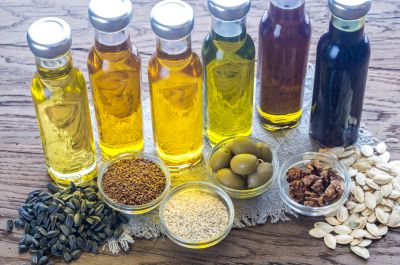Today, we want to talk about fat. What – really? Fat? It makes you fat! That may be, but the right fats can also contribute to helping our hearts work perfectly. Nutrition expert Martina Brischler knows exactly which fats our hearts heartily welcome, while also tasting deliciously like a vacation.
Top-tip: use more plant oils
Your heart is close to our hearts. That’s why Aramark works closely with the American Heart Association and tries to implement their recommendations into the dishes on our menus. You can also do much for your heart at home. Dietitian Martina Brischler’s top tip is super simple: Use more high-quality plant oils! A real delight, and not only for your heart. Because high-quality plant oils give even simple salads a special flavor and liven up soups or vegetable dishes.
Why oils are balsam for the heart

What makes plant oils so beneficial? They are rich in unsaturated fatty acids. The German Nutrition Society (DGE) is convinced: Including more polyunsaturated fatty acids than saturated fatty acids in our food decreases the amount of bad cholesterol in our blood. And according to current scientific knowledge, that reduces the risk of coronary heart disease.
Even monounsaturated fatty acids, such as oleic acid, are now considered to be beneficial. One reason for this: If oleic acid is combined with bad cholesterol, it remains more stable and doesn’t cause inflammation in our blood vessels quite as easily.
Dearest to our hearts: omega-3 fatty acids
Omega-3 fatty acids are highlights for your heart. They are not only found in plant oils, but also in oily fish. According to the DGE, these unsaturated fatty acids ensure there are fewer building blocks for fat and less bad cholesterol in your blood. It is thus very probable that they reduce the risk for high blood pressure and coronary heart disease. However, nutrition expert Martina Brischler points out that the relevant studies were conducted with very high amounts of omega-3 fatty acids – more than you can get from food alone. Nevertheless, increasing the amount of omega-3 fatty acids in your diet is beneficial. Especially because these fatty acids are essential. This means you have to ensure you’re getting enough of them from your diet, because your body can’t make them itself.
It is also important to strike the right balance between omega-6 fatty acids and omega-3 fatty acids. The ratio should be 5:1 – five times as much omega-6 as omega-3. However, our normal diet contains around ten times as much omega-6 fatty acids. A good reason to ensure you’re eating a higher proportion of omega-3 fatty acids.
In conclusion: more plant fat, less animal fat
 And what does that mean exactly? Here are three heart-healthy tips for choosing fats:
And what does that mean exactly? Here are three heart-healthy tips for choosing fats:
- Go for plant oils. Rapeseed oil, linseed oil and walnut oil have a particularly good ratio of omega-3 fatty acids. Quick tip: Oily fish such as salmon, herring, and mackerel are also rich in omega-3 fatty acids.
- Eat fewer solid (animal) fats. As a rule, solid fats contain more saturated fatty acids. So hold back on butter, lard and high-fat dairy products, but also on fatty meat and sausage products.
- Reduce trans fats. Trans fats increase the risk of dyslipidemia and coronary heart disease. They are generally the result of deep-frying or curing fats. That’s why you should eat less deep-fried, fried and baked food such as fries and flaky pastry. Even at home it’s better not to deep-fry, fry or bake at too high a heat.
And don’t forget: Fat is high in calories – even healthy plant oils. That’s why dietician Martina Brischler advises you to go easy with fats.
Martina Brischler’s meal tip for a healthy heart: Get inspired by Mediterranean cuisine. It’s full of plant oils, fresh vegetables and fish. “And Mediterranean dishes taste so much like a vacation that it really warms your heart,” gushes Martina Brischler, who loves holidaying in the Mediterranean.
Note: Since everyone’s health history and nutritional needs are so different, please make sure that you talk with your doctor and a registered dietitian to get advice about the diet and exercise plan that‘s right for you.

